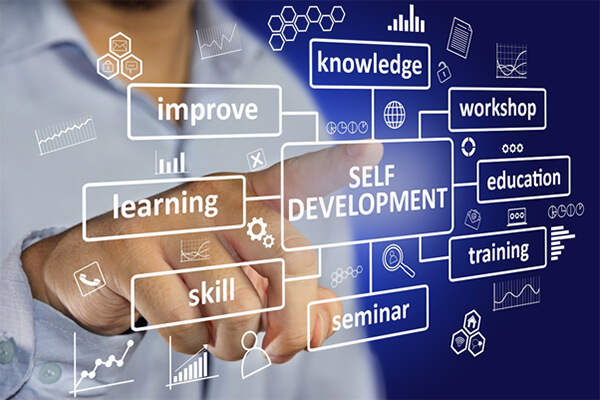12 Skills Adults Would Benefit From Learning
Lifelong LearningWhat does it mean to learn? Learning means adopting an open mind and allowing oneself to be exposed to new experiences and ideas to grow.
The excitement people used to experience about the world can be pretty difficult to remember and relearn as adults, but we all still need top learn. Despite their natural aversion to study, children are naturally curious about what they’re learning. Yet, as adults, sometimes, it’s easy to forget how important learning is.
Learning happens when people are open to new experiences, actively seeking new ways of learning and developing. There’s always a strong interest in what’s occurring in the world around them and always a desire to learn how to do better.
You’ll benefit significantly from learning if you cultivate it as a lifelong habit. It’s beneficial to have a variety of lifelong learning skills and it would be wise to develop them continuously throughout one's life. Skills that impact our future come from within us -- it's one of the reasons we are who we are. By attaining necessary lifelong learning skills, we can become better workers and learners and we can live better.

How do students best prepare for entering the modern workforce after school? The online learning platform documents.exchange recommends some of the most valuable skills adults would benefit from learning:
1. Problem-Solving
In the realm of lifelong learning, this is probably the most critical skill. To thrive in the present and future, we must solve real-world problems with solution fluency. Having problem-solving skills will help you if you intend to enhance skills like injection molding and other manufacturing skills.
We will continue to see a dramatic change globally, which means our kids will have to solve problems in the future that we have yet to comprehend. A problem must be defined accurately with a solution designed and the resolution put in use to resolve it. Students with critical thinking skills can solve virtually any situation, from preparing a grocery list to creating a spaceship.
2. Coaching
What qualities do good coaches possess? Coaching is a personal, social, and sometimes even a 'business’ activity. No matter if you're a professional coach, a leader, manager, or using your coaching skills for personal development, there are several essential skills that you must master.
Any coach must strive to facilitate the person's learning process or people being coached to be successful. The best coaches don't consider themselves experts to be able to solve every problem. Instead, they look to themselves as guides who help the student learn.
Coaching entails highly developed emotional intelligence: coaches have a great understanding and relating skills and pay attention to people. An outstanding coach has to be genuinely interested in helping others grow. Taking the idea at face value isn’t enough.
As a coach, you need to demonstrate empathy and be great at building relationships and maintaining a good rapport with players. Excellent coaches are also good communicators.
3. Adaptability
The world is constantly evolving and this is a reality. However, you also need to keep up and observe your personal lives, so you have to be flexible. Living a liquid life is tricky—sometimes it's a calm ocean, then a river, next to a river, then a wavy sea. Stay afloat!
Businesses, science, entertainment, technology, and lifestyle trends all play a role. A significant trend often has several components of its own, which makes it more challenging to evaluate. Keeping updated on all these activities means staying informed and taking advantage of any possible chances when they arise. Even when everything is going smoothly, life itself will always pose some sort of challenge. No matter what climate you're in, not only can you adapt to change, you’ll be able to succeed as well.
4. Self-Direction and Motivation
The adult learner's mind is much more self-directed and motivated than the mind of the young learner. As an adult, most people tend to learn when they feel they have to, rather than when they are told to or feel they must do it. Even though adults have a tremendous reservoir of motivation, it doesn’t mean that they’ll learn anything.
Learning must be valuable and worthwhile to adults. Students must see what they’re expected to gain by interacting with their learning program, or they’ll lose interest quickly. Engage learners with the content by demonstrating its value and they're more likely to be happy with what's on offer. Workers can be asked to assess their own learning needs, plan how to reach their goals, and obtain necessary resources.
This type of learning works best with online learning. The system allows employees to follow flexible learning paths. It provides users with curated content by recommending learning topics that will minimize skills gaps. The system works with an artificial intelligence program designed to deliver tailored content to each individual based on its preferences.

5. Critical Thinking
Success in a changing world requires the ability to think critically. You can find many online resources about enhancing your critical thinking skills. It’s about thinking independently while being responsible and productive at the same time.
More than just personal experience, the way we think about ourselves, the world, and other people affects how we perceive things and this affects our behavior. A cultural concept that reminds us that our actions affect everything doesn’t have to overwhelm us, so we can simply remain aware of it as a critical aspect of critical thinking.
6. Communication Skills
In all aspects of life, having effective communication skills is crucial. In the workplace, it’s essential to communicate your ideas and opinions to your fellow employees and employers. Your voice and thoughts might not be heard without this skill. It’s crucial to develop both verbal and written communication skills especially if you’re in your workplace.
Verbal and written communication skills can be acquired online. There are websites that you can search online to develop the skills. Written communication is a skill that you should learn first and many websites offer courses to help improve your writing skills.
Verbal communication is second, as it’s the backbone of sales presentation and of every meeting. You should take Alison’s Developing Effective Business Presentation Skills course if your job requires you to attend regular meetings. This course is free and teaches you how to properly organize presentations and tips for speaking in front of groups.
If you have the same fear or anxiety of speaking in front of a group as the 75% of people, enrolling in an online course may not help you conquer the fear. One of the best ways to practice your verbal skills is to join some circles or clubs and even online events that will allow you to speak with many people. You’ll effectively overcome your fear only through regular speaking opportunities. As long as you master the basics, lots of practice is all it takes.
7. Collaboration
These skills include expertise in communication, compassion, cooperation, and teamwork values, along with the ability to work in physical and virtual groups. In addition to getting along with someone worldwide, it also means performing productively with someone internally within your company or office. That’s why collaboration skills are being taught across the globe and in every classroom.
We are seeing groups working more and more in our digital generation. Many platforms and businesses have incorporated collaboration into their daily operations. Because of that, the ability to collaborate is still at the top of the list of essential skills that you need for a lifetime.
8. Technology
Your position will require you to be comfortable with computers, no matter what. It might just be using email or project management tools like Slack, Asana, or Trello, or maybe even editing web pages in WordPress or using accounting apps or software. Learning new technology skills will help you prepared for your boss's demands and speak intelligently with technology professionals, giving you an advantage over other employees who may not be experts in this area.
There’s an opportunity to obtain different skills via the Internet. The technology community has fully embraced the Internet's abilities to extend to the learning market. Many websites are dedicated to teaching specific tech skills, including many Massive Open Online Courses (MOOCs). Still, you can also search within your search engine for questions regarding these skills.
You can use the interactive learning tools for coding instruction which is also available on online academies such as Codecademy or Khan Academy. They provide online tutorials and mini-lectures about coding, as well as several other subjects. If you prefer to learn with videos, WordPress is another option for you. They have free educational resources that are available for you. If you aren't familiar with SEO, you can get started with Moz. They have blogs and free educational resources which are great places to learn more about the basics.
9. Leadership
One of the most valuable life skills is learning about leadership. Understanding leadership can lead to positive changes in people's lives. Leadership goes beyond simply managing things. It’s about inspiring, motivating, and enforcing. Throughout all of their work, true leaders teach people how to maximize their potential.
Natural leaders make every classroom and workplace better. Anyone who moves from the "I can do it" attitude to the "We can do it" attitude helps us. Those with good leadership skills see more, do more, and learn more. They’re independent and take responsibility for achieving good results, not simply getting things done.
10. Information Management
The Internet is essentially all about information and obtaining it has never been easier. At the time of writing, there are 2.5 quintillion bytes of data being generated online each day, according to VCloud News. The Information Fluency program teaches us to decipher much of the information and use it effectively, even in the face of so much out there.
The information enables us to determine which sources are trustworthy and which are not. Genuine products and solutions need to be developed in the marketplace. It's also vital to conduct research and assign credit to sources, which is critical knowledge to possess for a good digital citizen.
11. Language Learning
Being culturally open to new cultures is a great way to boost your career in this rapidly changing economy. Being able to speak another language not only allows for employment, but it’s also a great benefit to one's brain in several ways.
Primarily, it works to increase brain function, heighten a person's concentration span and decrease the risk of having an age-related decline. The second reason is that when people are thinking about learning a second language, their decisions are always logic-based rather than emotion-based.
The days of just listening to repeating rote drills and cassettes are gone. Online language learning has become very sophisticated. Duolingo is one of the free language-learning apps that teaches more than 19 different languages with a fun interface and gamification technology. Other great choices are Babbel and Open Culture.
12. Reflection
Learning leads to new abilities and knowledge for many uses. However, if we don't take the time to examine our own and others' experiences, this knowledge won't serve us. If we intend to learn something, we need to evaluate what we will gain from learning it beforehand, during, and afterward, otherwise we can engage in poor learning without purpose. In any learning situation, asking theoretical questions is always a must.
Most importantly, reflective learners consider how or what they’ve learned has helped them achieve their original goals, commonly solving a problem/responding to a challenge. It’s essential to reflect on learning to gain lifelong learning skills because it’ll hold real meaning if it’s done in a meaningful way to the learner.
Further Reading from Skills You Need
The Skills You Need Guide for Students

Develop the skills you need to make the most of your time as a student.
Our eBooks are ideal for students at all stages of education, school, college and university. They are full of easy-to-follow practical information that will help you to learn more effectively and get better grades.
Conclusion
It's very convenient to study online. You no longer do have to think if you need a car or need to commute to get to class or if there’s room for you when you get to your campus, or if you're going to be home for the holidays. You can enroll in a great educational institution from your laptop or computer at your convenience.
Internet access is even more critical for those of us post-college but still hungry to gain additional skills and knowledge. Much information is available for free or at a reasonable cost and can be accessed at any time anywhere at your convenience. Anyone interested in autodidactism and online learning should consider the options.
About the Author

Rose Carlson is a developmental psychologist with years of experience providing vocational training and educational support to people with disabilities. She writes helpful articles online to inspire people to attain their maximum skill levels with confidence. Rose balances her career and personal life by spending time with her family on weekends. She loves shopping, gardening, and traveling.

